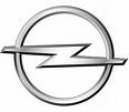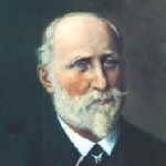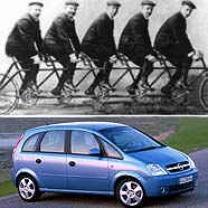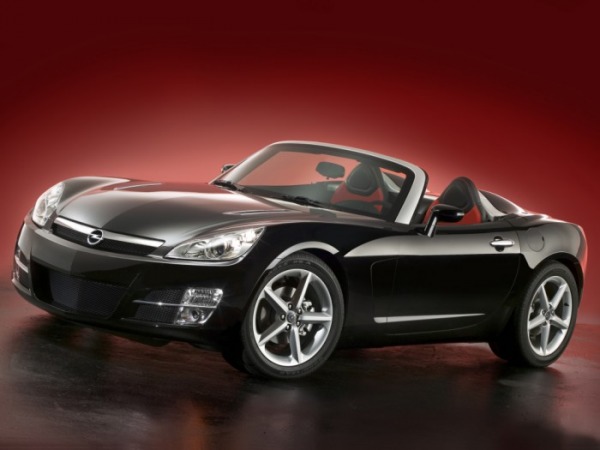Opel-History

The Opel automobile family traces its roots to 1838 in the town of Rüsselsheim, Germany and the birth of Adam Opel. As a young adult, Adam Opel toured Europe extensively and learned to make sewing machines while in Paris. Fascinated by these machines, Adam Opel, then only 25 years old, opened a factory in Rüsselsheim for volume production of sewing machines.
In 1868, Adam Opel married Sophie Marie Scheller and began a family which would include five sons: Carl, Wilhelm, Heinrich, Friedrich and Ludwig, all of whom would be involved in the family business. In 1885, Adam Opel expanded production to sell fully assembled bicycles in Germany.
When Adam Opel died in 1895, the company was making 2,000 bicycles a year and was leading Europe in sewing machine sales. With the encouragement of their mother, the Opel brothers decided to move into the fledgling automobile industry and would produce their first motorcars in 1899.
The first Opel motor car in 1899
Opel's first endeavors in automobile production were undertaken together with partners, first with the engineer Friedrich Lutzmann from Dessau and later with the French company Darracq. In 1902, Opel presented the first design of its own, a 10/12 hp model with a 2-cylinder engine. Seven years later, Opel introduced a compact two-seater which was especially liked by country doctors and became known as the "Doktorwagen" (Doctor's Car).
1899 - Opel contracts with carriage builder, Friedrich Lutzmann from Dessau, to build its first automobile, the "Opel Patent Motor Car, System Lutzmann" in Rüsselsheim.
1902 - Presentation of the first car to be developed completely by Opel, the 10/12 hp model with a new two-cylinder engine with built-in water pump. Top speed: 45 km/h.
1909 - Introduction of a 4/8 hp model with a 4-cylinder engine, known as the "Doctor's Car", priced at 3,950 marks. Opel takes the first step towards making automobiles that are affordable for broader sections of the public.
1912 - Completion of the 10,000th Opel. First collective bargaining agreement sets standard working hours (55.5 hours per week) and minimum wage (36 Pfennigs per hour).
1914 - Opel becomes the largest German automobile manufacturer, selling 3,335 automobiles. Opel begins to employ women on its assembly lines.
1928 - With a market share of 37.5% and 42, 771 units sold, Opel is Germany's largest automobile manufacturer. Opel becomes a stock corporation (a German Aktiengesellschaft").
1929 - General Motors acquires 80% interest in Opel.
1931 - General Motors acquires the remaining 20% of Opel shares. Opel becomes a 100% General Motors subsidiary. The company's 13,000 employees produce 500 cars and 6,000 bicycles daily.
1935 - Opel is the first German manufacturer with an annual production of 100,000 automobiles. The new P4 model priced at 1,650 marks is later reduced to 1,450 marks, making this a highly economical car unequalled by the competition.
1936 - With an annual production of 120,923 vehicles, Opel is Europe's largest auto producer.
1940 - Opel produces its one-millionth vehicle. Passenger car production stops in October.
1944 - Rüsselsheim and Brandenburg plants are destroyed by bombs.
1945 - Production equipment for the Kadett model is dismantled by the Soviet Union.
1946 - The first post-war Opel, a 1.5-ton Blitz truck, rolls out of the factory.
1956 - The two-millionth Opel is produced. Opel doubles production capacity with the inauguration of the new body plant, K 40.
1962 - Opel celebrates its 100th anniversary and inaugurates the second plant in Bochum.
1981 - Opel is the first automobile manufacturer to introduce environmentally compatible water-based paints.
1982 - Opel constructs a new plant in Zaragoza, Spain for the production of the Opel Corsa, the most compact car ever produced by the company.
1983 - The 20 millionth car leaves the Rüsselsheim plant.
1985 - Opel becomes the first manufacturer to offer a complete range of models equipped with catalytic converters.
1987 - Opel celebrates its 125th anniversary.
1992 - Opel's new, state-of-the art plant in Eisenach, Germany sets the standard for future lean manufacturing facilities of General Motors.
1994 - Opel produces its 30 millionth vehicle and becomes the main sponsor of the FIFA Football World Cup in the U.S.A.
1995 - Opel becomes the first German manufacturer to open an assembly plant in Poland.
2000 - Opel announces the most significant engine offensive in its history. The ECOTEC engine generation is largely modified to further increase performance, reduce emission levels and fuel consumption.
2002 - The Corsa, the world's most successful small car, celebrates its 20th birthday and a production record of 11 million units since it was first delivered in September 1982.



